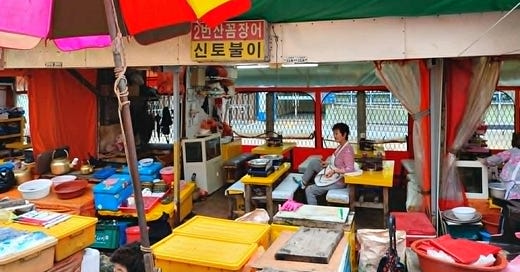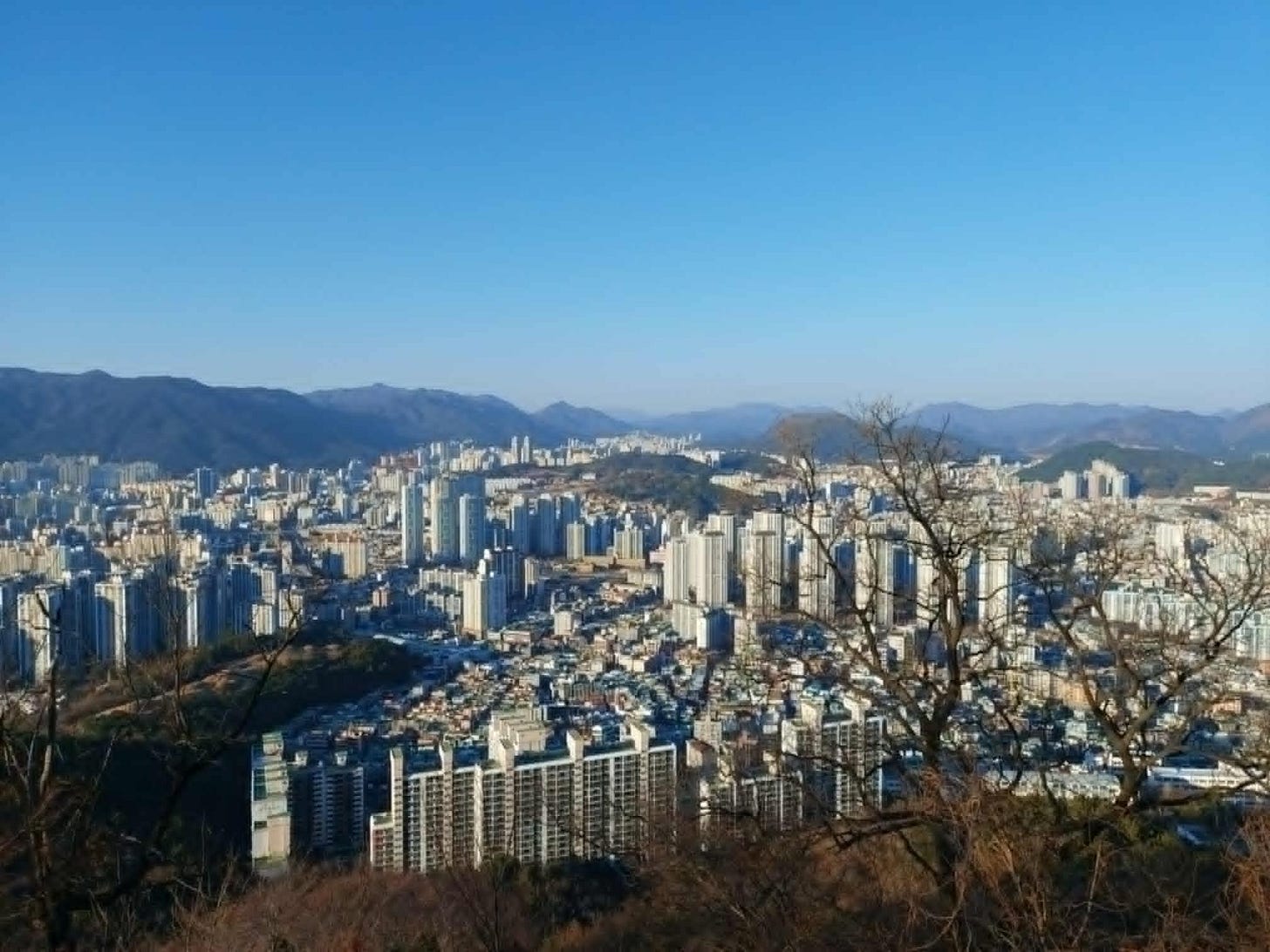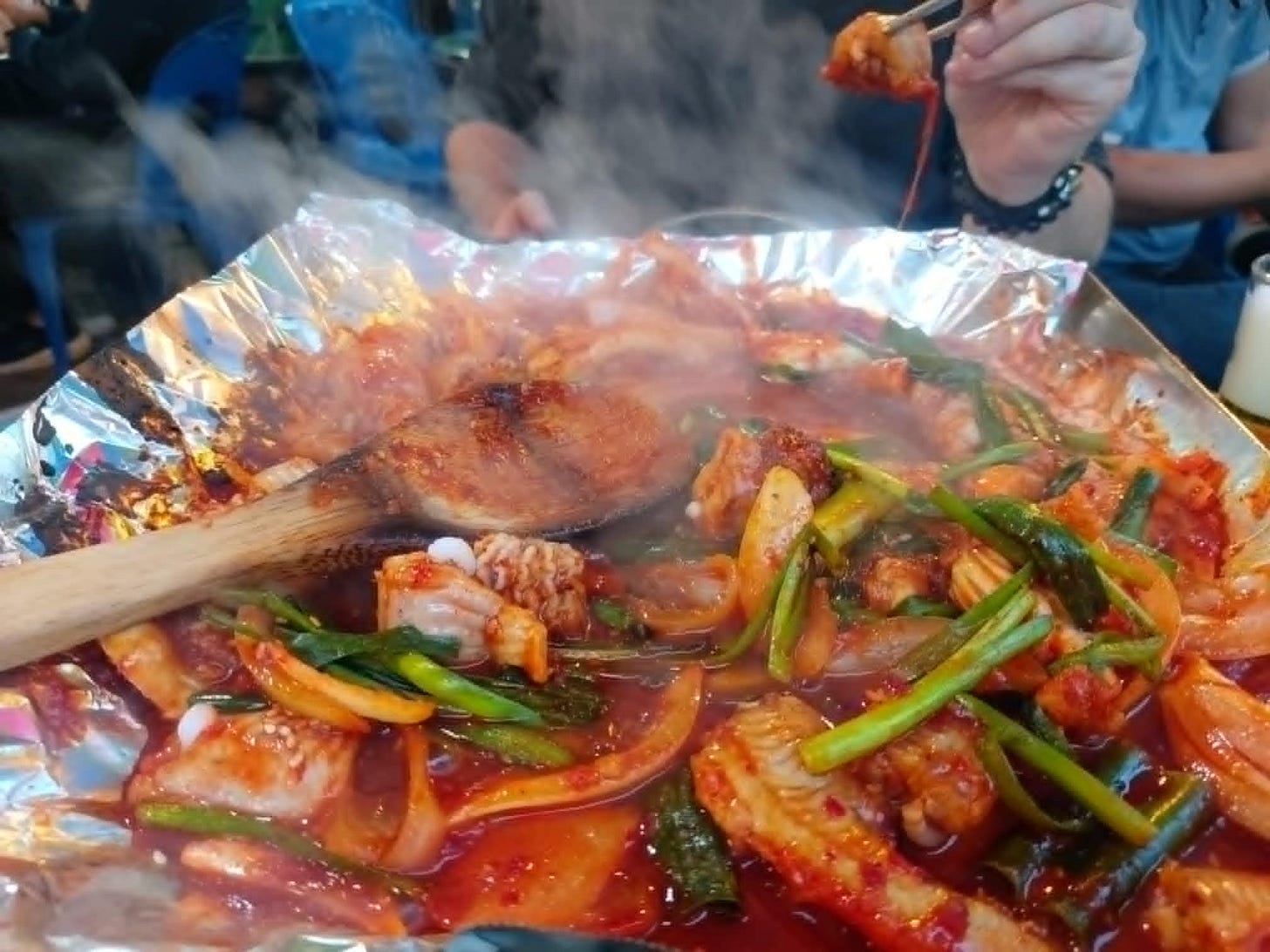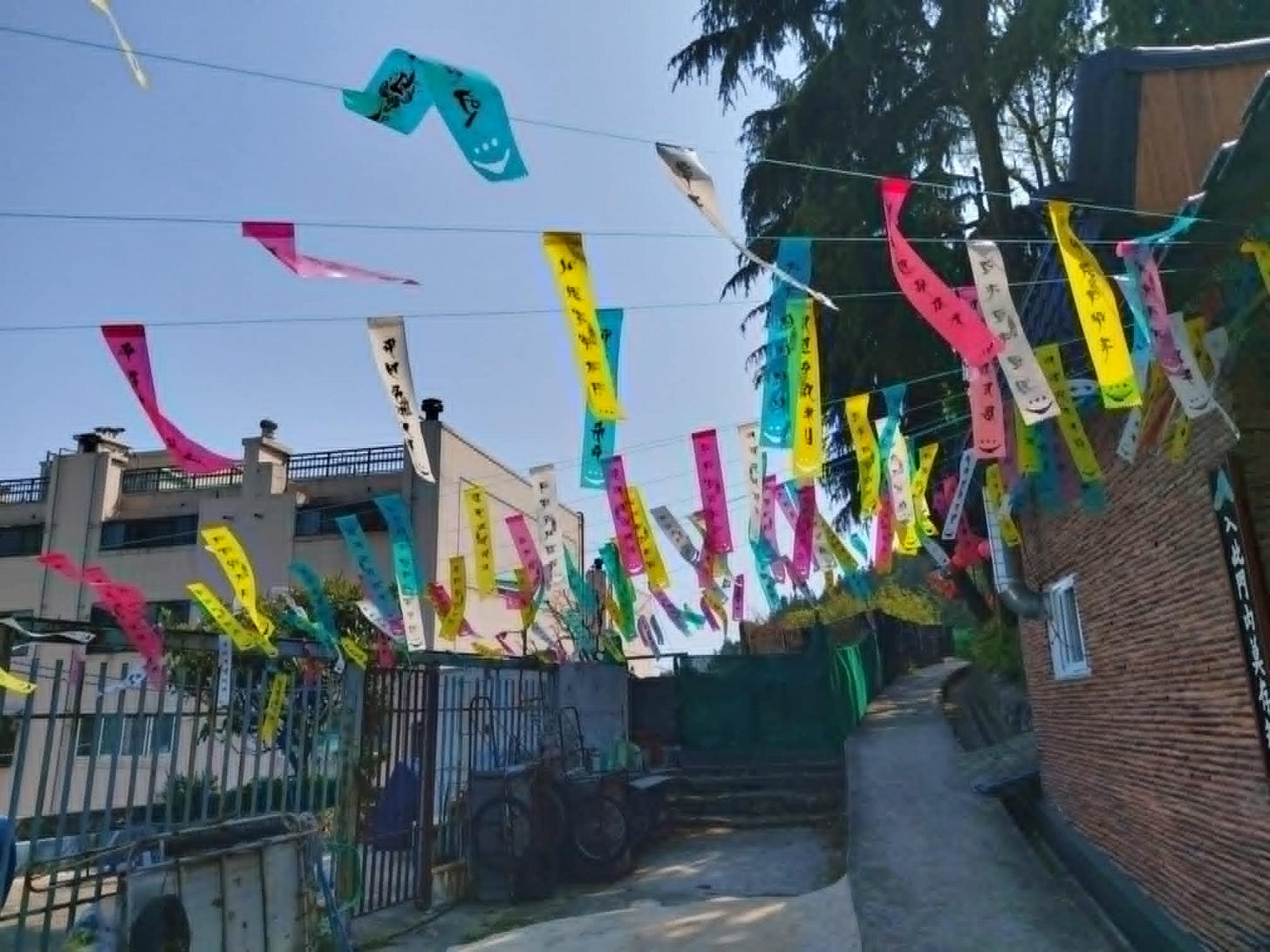It was only going to be for a year, two at the most. I’d take the job, fly to Korea, work hard, sock away some much-needed cash, and maybe do a bit of traveling when my contract was up. I’d relish in a bit of adventure while figuring out what to do with the next act of my life, and once that restlessness was finally out of my system, I’d return to the US, go to grad school, and commit to the life of a regular, shiny cit, self-satisfied in the knowledge that I’d enriched myself by living abroad for a spell.
Life however, has a tendency to get in the way of our best-laid plans; the charms of Busan were so potent and immediate that I knew within hours of getting off that plane I would not be heading home anytime soon. Once I sat down at an outdoor table with my new colleagues for a late-night feed of grilled pork belly, the threads attaching me to America suddenly began to disintegrate. I leaned back in the cheap plastic chair, gazed at the kaleidoscope of lit-up signs glowing on the sides of the buildings, and felt something give. As I munched on pork and kimchi, took a swig of ice-cold Cass beer, and gulped down that thick August air, I knew deep down that I’d be staying for a very long time.
Do you believe in love at first sight? I certainly do, as I’ve experienced it a couple of times in my life with people—an immediate, dizzying, almost overwhelming connection that moves like wildfire and has a life of its own. However, it wasn’t until I arrived in Busan that I realized the same thing could happen with a place. I felt not only an ease and comfort with this massive, hyperkinetic, very foreign East Asian metropolis, but a sense of belonging, despite the fact that I couldn’t speak a lick of the language, knew very little of the history, and had no connection with the place other than the English teaching gig that lured me onto the plane in the first place.
I arrived alone, naked, and dumb, and Busan took care of me: I was given a job and a clean, modern apartment, and within a week I’d not only been introduced to a brand-new crew of people, but I’d also managed to score a girlfriend. It was unreal, as if once I went through customs and immigration, I was handed a magic bag containing a whole new life. I felt like I had entered the Witness Protection Program.
Those early days were surely full of magic and wonder. The fact that I had washed up on Korea’s rocky shores so ignorant of what made the place tick proved to be an advantage, in that everything was irresistibly new. I was surrounded by not only unexplored streets, but also unexplored cuisine, culture, and people. I was given a whole city to dive into—a rich, shimmering urban center that seemed to not only work, but thrive. And it also was a place that the rest of the world didn’t seem to know too much about, which only added to the mystery. When I mentioned that I was living in a city called “Busan” to almost anyone outside of the peninsula, their faces invariably slackened with blank, paralyzed looks. “Don’t you mean Seoul?” they’d ask.
“No, not Seoul. The second city.”
Busan is a bustling port city of 3.5 million souls on Korea’s southeastern coast. Famous for its wide sand beaches, buzzing seafood markets, and annual film festival, this once-tatty port town has stepped out of Seoul’s shadow in recent years to soak up her own glory. Busan has become sexy in her own right, and I am happy to brag that I was well into her before she was cool.
Over the past two decades this city—more than anything—has acted as my muse. I started writing about Busan straight out of the gate, back in the blogging heyday of the early aughts, before big tech moved in and burned it all to the ground with the Borg-like, many-tentacled ogre that is social media.
My timing was perfect, in a sense, and I posted raw, ranty, confessional posts about my life as a fish out of water, which quickly garnered an audience. I also wrote about the pure, naked joy of discovering this new place—the food, the friends, the boozing and misbehaving—along with the heartbreak and horror that life can deliver anywhere, which for me was losing both of my parents in the course of a single year.
While my blog never went officially viral, I did build up a dedicated readership, and would often get approached by newbies out at the bar who told me they read my stuff before coming to Korea, that my online ramblings served as both a guide and inspiration to them making the leap, which to this day is the greatest praise I’ve ever received as a writer.
Of course, the blog opened the doors for my first actual writing gigs at websites like Matador Travel and Monkeygoggles, both of which paid me a whopping twenty-five bucks an article (!), and also caught the attention of a fellow writer in Hong Kong who started an indie press that went on to publish both my Korea memoir and a second book of travel essays.
None of this would have happened without Busan, nor the subsequent more “big league” assignments and commissions that I enjoy to this day. I often think of how my life as a writer would have turned out if I had just stayed in America, and who knows, perhaps my nose for political rants or even my fiction could have brought me some success, but I doubt it. I’d just be one of many dudes blasting my words into space and hoping someone was reading. Moving to Korea—and especially Busan—gave me the scoop of my life. And the fact that I’ve stayed—while most every other wannabe Hemingway has packed up his bags and returned home—gives me a corner on the market. Perhaps the main reason I work as a “professional” writer these days is simply due to the fact that I outlasted my competition. By not leaving, I won the war of attrition.
This is an anniversary post—a way to track time—and I put off doing it all week because I wasn’t sure if I wanted to write it in the first place. After all, how do you sum up the hallucinatory, fractyled blur of twenty years in a singular, unique place over the course of a couple of thousand words?
I mean, I’ve already done it. I have written about Busan extensively this whole time, both personally and for some of the biggest media organs out there. I regularly go on TV and talk about this place for the Korean English-language channel Arirang. Whatever “writing career” I have now hangs its whole hat on me waxing on about how great this town is, so what more could I possibly have to say?
To describe my life in this particular corner of the globe over the past two decades would require a whole new book, or even two. Perhaps I’ll get there (There is a queue!) down the road, but what I can say is that Busan is a city that still surprises me, still embraces me, and still stokes the coals of inspiration deep in my chest. One of my favorite things is to just lace up my shoes and start walking, without a plan, to just see where my feet take me. Each and every time I end up pinching myself as I get lost among the alleys, beaches, and stony hills that make this place such a stirring blend of nature and human activity.
To really appreciate Busan, you should see it from the air: the alabaster tendrils of apartment blocks and shimmering high rises stretching like fingers into the sea; the marvelous span of Gwangan Bridge; clustered, multichromatic neighborhoods snaking up valleys and hillsides; slivers of golden sand bordering the edges, and pine-smothered mountains standing vigil over the whole affair like ancient guardians.
While comely from the above, you can’t really understand this town untill you plunge in at the street level, whether it’s taking down a bowl of dwaeiji gukbap (pork soup) in a sweaty restaurant packed full of soju-swilling, bellowing ajeosshis, or spelunking one of the many traditional markets that make this city’s blood pump, punctuated with the aroma of fresh fish, sizzling pork, green onion, and earthy kimchi.
You can’t know Busan until you’ve felt the sand scrunch under your feet while seagulls swirl and squawk above you at Haundae Beach; until you’ve downed black goat bulgogi and local makgeolli in Sanseong Village atop Mt. Geumjeongsan. You can’t know Busan until you’ve schmoozed with Euro filmmakers at an after party at BIFF; until you’ve drunkenly sung Busan Galmaegi with twenty-thousand fans at Sajik Stadium, or listened to the waves blast the rocks at Haedong Yonggungsa Temple, or until you’ve at happily shivered at an outdoor food stall in Jagalchi, nibbling on atomically spicy eel while the relentless, Siberian January wind does its best to beat you down.
All of these experiences are mine, of course, and make me believe that I know this town, but a city is not a static place, it’s a hub of commerce and existence that is always shedding its skin, so the Busan that I know won’t be the Busan someone else falls in love with. She will present a different face, ever so slightly, and there is something beautiful in that.
I love Busan because she’s a remarkable city that excites me on some level every time I walk out the door, but moreover, because she was the place of my redemption. I was wounded and beaten up when I came here, a failure by most every measure. I had lived an illustrious life back home full of a few peaks and many valleys, but by the time I was thirty-three I was broke and broken and seeking a second chance.
Busan gave me that. And I would have moved pretty much anywhere at the time. I didn’t seek Busan out, but rather stumbled here by chance, and knew that first night just how dumb my luck was. The only words I could really say were “Thank you.” And then “Yes, please.”
A few weeks ago I was out with a friend visiting from Seoul. We sat on plastic stools at a pojangmacha, the red drinking tents that Busan is famous for, snacking on grilled mackerel, LA galbi, dumplings, and squid. He’s an old Korea lifer like me, and in between shots of soju—as boats in the harbor bobbed just feet away—he confessed that he hadn’t been to Busan in over ten years. He then glanced at all the people eating, drinking and laughing, while the smoke from barbecued fish wafted between us, and shook his head, clearly wondering what had taken him so long. In that moment I could see that he clearly got what had kept me here all of these years, despite the unending allure of action and career-advancement that the capital has to offer.
Twenty years. It really does go by in a rush, a vertigo-inducing reel of flavors, faces, sounds, snapshots, and the ineffable weight of emotion that sits at the bottom of my gut like a rock on fire. These years compacted feel like a fever-dream, and I’m still not sure if they’re really real, but today I still find myself in this crazy city that I moved to all those moons ago on a fucking whim. Here I am. Married, still dizzy, and more acquainted with the topography of Busan than many who grew up here.
I will celebrate tomorrow with a meal of nakji bokkum, the spicy octopus stir-fry that is one of the first foods I took down here. I remember that night—my second in the country—where I wandered into a random restaurant with a cutesy, anthropomorphised octopus on the sign, sat down, pointed to what the table next to me was eating, and proceeded to sweat in an August-induced bliss while the chili peppers went to work and lit me up like a human match. I felt on fire—vital—and when the old ladies in the kitchen poked their permed-heads out to laugh at the spectacle of this white man gushing sweat over their spicy dish, I knew that their cackles weren’t mockery, but instead, a kind of love.








Wonderful story about a city that has captivated you for two decades. Thanks for sharing, Chris.
It reminded me a little of how my post high school gap year in Europe ended up lasting forty years.
Beautiful portrait of Busan! Also when the cold beer, pork belly, and plastic chairs combo hits just right, you have no other option than to fall in love with the city.